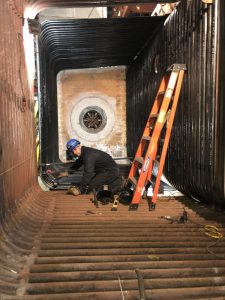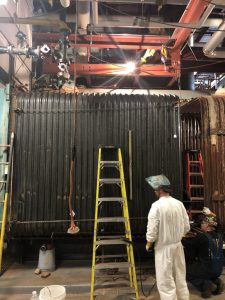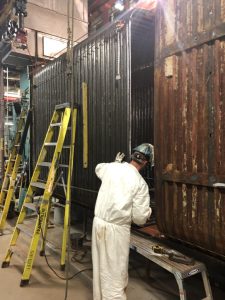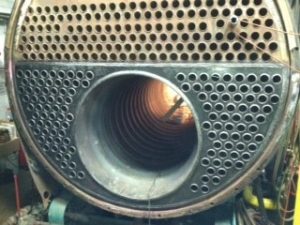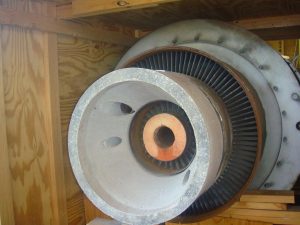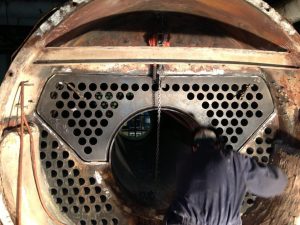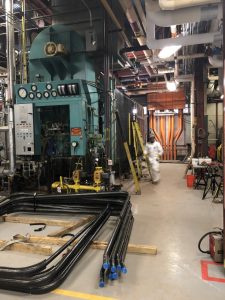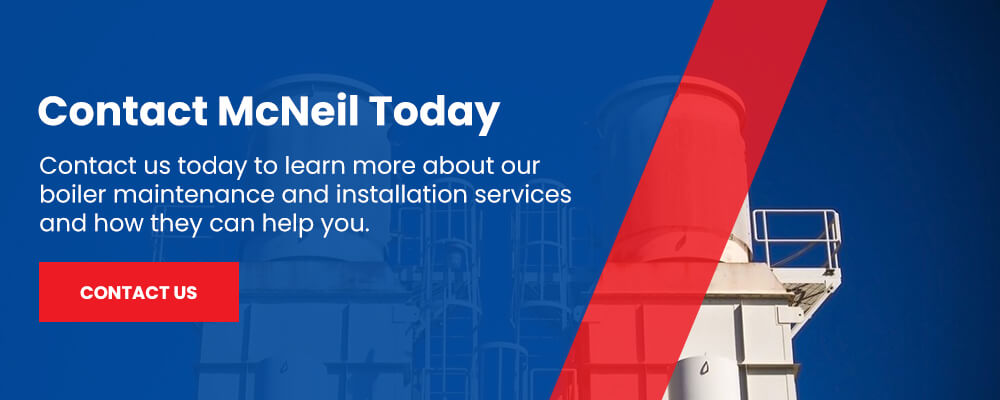Boiler Maintenance Checklist
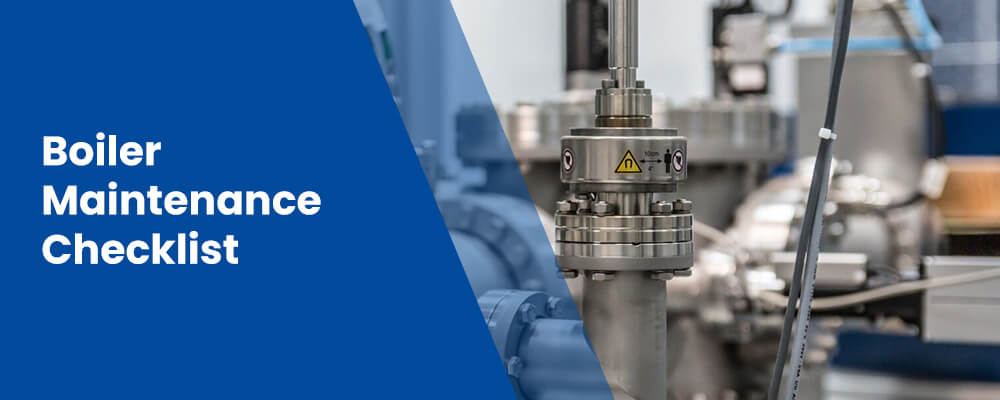
When was the last time your boiler was checked? If you can’t remember, it’s probably time to schedule some routine boiler maintenance. Just like cars, boilers also need a tuneup every so often. In addition to making sure everything is functioning, scheduling boiler maintenance is the best way to prevent future malfunctions, increasing the longevity of your heating system.
So, how often should you get boiler maintenance, and what exactly needs to be checked during routine maintenance? The following boiler maintenance checklist will provide all of the information you need to ensure your heating system is running at its peak for years to come.
What Requires Regular Maintenance on a Boiler?
Every boiler system has various parts and devices that are essential to maintaining the system’s safety and efficiency. To ensure the safe operation of your boiler, all fittings must be checked and maintained properly. In addition, electrical components, combustion ability and safety sensors should also be checked often. There are a lot of elements of a boiler that should be checked, and below is a list of a few of the most important boiler checklist items:
- Pressure gauges: To ensure the safety of those in proximity to a boiler, pressure gauges must give accurate readings. When they don’t, they need to be replaced immediately. The observation of gauges should be done frequently — ideally daily or weekly — and can be tested easily using special equipment.
- Steam traps: These function to remove excess water, air and condensation without removing steam from a steam boiler. When broken, steam traps will either close completely and not remove any condensation, causing erosion and damage to the system, or open completely, allowing for the free flow of steam, wasting energy. These systems should be checked at least several times a year, as they’re integral to the efficiency of boilers.
- Insulation: A significant amount of energy can be saved by periodically checking the boiler system pipe insulation. Improper insulation can unnecessarily cost thousands of extra dollars in energy. Periodically check the insulation using proper technology.
- Valves: There are many valves that control various aspects of a boiler room system, from steam to hot water. Malfunctioning valves can rack up high energy costs, so you should check them weekly using a thermal imager.
- Pumps: A boiler operates through the function of several pumps. These systems should function properly, as a leak or failure of just one pump can shut down the entire boiler system. Different pumps can be tested using a variety of methods and technologies. These tests and checks should be done at least monthly.
How Often Should You Perform Maintenance on a Boiler?
There are various maintenance checks you should perform on a boiler system on a regular basis. These checks range from simply looking at a physical component visibly to taking apart the majority of the system and using equipment to clean and test for more serious issues.
In short, there isn’t a simple answer for how often boiler maintenance should be performed. However, if we dive deeper into what goes into routine maintenance, we can better understand frequency requirements.
What and How Often to Check When Performing Boiler Maintenance
In order to know what to check and how often to do so, it’s important to categorize elements of the boiler system by maintenance importance. While you don’t need to check everything daily, you do have to perform some daily inspections. To more easily understand the various types of maintenance, the components of boiler operation you should check and the frequency of boiler maintenance, let’s break it down by prevalence:
1. General/Daily Maintenance
While you can perform more thorough maintenance on a less frequent basis, there are daily boiler operation checks you should do to ensure the safety and functionality of the boiler system. These checks can be as simple as looking to see that the pressure and temperature are within normal range and checking for any strange noises, smells or leaks, and reporting them if any are found.
2. Weekly Maintenance
On a weekly basis, you can also perform certain preventative maintenance checks. These checks can include checking the burner and draft controls, the air damper on the burner, valve operation and the igniter. Additionally, you can perform tests to make sure the system has an appropriate response to flame failure, shutdowns and other situations.
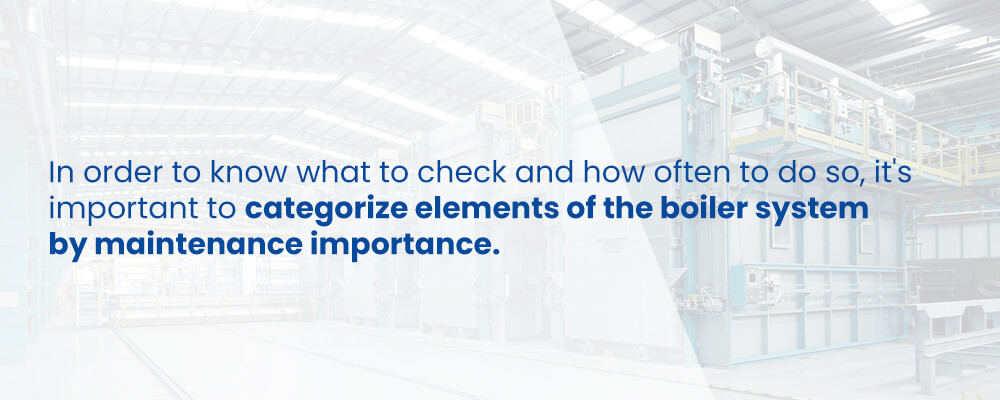
3. Monthly Maintenance
If you’re already performing daily and weekly maintenance checks, your monthly boiler maintenance can be more detail-oriented. When doing monthly maintenance, test limit and flame detection controls, check blowdown and observe floor drains and air inlet screens to rule out any issues with obstruction.
4. Yearly Maintenance
If you can’t perform routine maintenance for your boiler room more frequently, you must complete annual boiler maintenance. During this maintenance, a licensed professional should inspect the heating system, performing several rigorous tests to verify the functionality and safety of the boiler.
The LWCO and ALWCO should be disassembled and checked for blockages, corrosion and defects. Additionally, settings should be checked for accuracy — if not reset — and the fire side should be checked for soot and damage and the water side should be checked for corrosion. Clean the entire boiler inside and out, as well.
Why Follow Maintenance Best Practices
If your boiler is working correctly, you may be wondering why it’s recommended to perform maintenance so frequently. When thinking about boiler and heating system maintenance, it’s important to remember the main purpose of boilers. This is heavy equipment, often responsible for heating the entirety of large buildings. These systems operate under extreme temperatures and working conditions.
Therefore, it’s necessary to ensure your boiler is subject to routine maintenance to guarantee reliability and safety. There are many reasons for and benefits to frequent boiler operation maintenance, including:
- Reliability: Depending on the facility where a boiler is housed, it may be in charge of heating a building full of people, such as a school, or responsible for the operation of machinery for an industrial processing operation. No matter what purpose a boiler has, it’s necessary to have a reliable source of heat and power at all times to maintain regular operations. Routine boiler maintenance can ensure all systems operate correctly, preventing any downtime or other issues.
- Efficiency: All machines are subject to wear and tear, and although it may not seem like a problem, minor issues like leaks or corrosion can lead to more fuel usage, costing you more money than necessary and causing larger problems. The more frequently your boiler is checked, the less often these problems will occur.
- Longevity: Small problems build up over time and can eventually lead to premature wear or breakage of the heating system. Breaks can also occur in individual parts, causing you to purchase a new system or replace an expensive part. Frequent boiler system checks can prevent these decisions from being made in the first place — routine maintenance is the best way to increase the longevity of your heating system.
- Safety: While longevity and efficiency are important, the biggest concern when it comes to boiler failures is the safety of others. There are usually a significant number of people in buildings with boiler systems, so any breakdowns could potentially endanger the lives of hundreds of people. By inspecting your boiler operation routinely, you can ensure that the system meets legal requirements and keeps your workers safe.
It’s essential to all aspects of your operation that your heating system is functioning properly. The proven way to optimize all of these important elements is through routine boiler maintenance. Performing regular inspections of equipment can ensure you can continue operations as normal while making sure workers are safe for years to come.
Contact McNeil Today for Boiler Maintenance Services
At McNeil, we provide high-quality materials and customer service for all radiant heat system management needs. Whether you need new refractory shapes or an entirely new boiler room operation, we’re ready and willing to help whenever you need it. Keep your operation up and running with McNeil’s maintenance services — whether it’s monthly or yearly tuneups, we’ll do what it takes to preserve your steam boilers or gas boilers.
Contact us today to learn more about our boiler maintenance and installation services and how they can help you.
Maintenance In Progress: Our Team at Work
